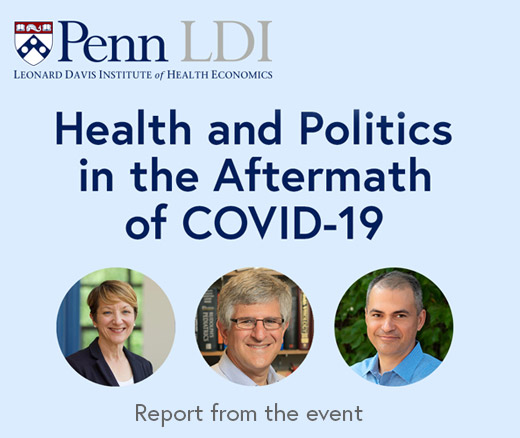
Contradictions That Confuse Federal Food Policies
Announcing Bold New Goals While Crippling the Infrastructure Needed to Achieve Them
Population Health
Blog Post

In the last decade, eight U.S. cities and dozens of countries have adopted sweetened beverage taxes to generate revenue for community programs and improve health. Penn LDI Senior Fellow Christina Roberto and colleagues recently summarized research findings about the effects of the taxes on health in a policy brief.
While it can be difficult to assess the impacts of a single policy change on health status, there are clear associations between adoption of these taxes and improved dietary behaviors and health. As leaders consider whether to extend their current sweetened beverage tax and more officials adopt them against the wishes of the beverage industry, this growing body of research can help ground the policy discussion in evidence.
According to the research, sweetened beverage taxes are associated with:
A meta-analysis of 35 estimates from 33 studies of 16 tax policies around the world found that jurisdictions that implemented taxes saw an average 15% reduction in sugary drink sales. In the U.S., the average reduction was 27%.
The research also establishes that sugary beverages are not replaced by other sugary foods. The largest study to date examined changes in sugar intake 11 months after a sweetened beverage tax in the U.K. and found a reduction in daily intake of added sugars by about 5 grams in children and about 11 grams in adults. The largest U.S. study found that a sweetened beverage tax in Philadelphia was associated with a reduction of .81 servings of soda per week among adolescents two years after tax implementation.
Various studies have shown associations between the taxes and improvements in child, adolescent, and adult weight outcomes. In Seattle, one year after implementation, there was a 1.1% reduction in child adiposity (the total amount of fat stored in the body). In Philadelphia, three years after implementation, adult body mass indexes (BMIs) were down 1.1%, but no clinically significant changes were found for children. Data from four California cities found that sweetened beverage taxes were associated with a 2.8% decline in BMI percentile among children and adolescents four to six years after tax implementation. International studies have shown larger declines (ranging from 2%-8%) in girls, although lesser or no effects for declines in boys.
There is evidence of short-term oral health improvements in jurisdictions with these taxes. An analysis of more than 80,000 electronic dental records found that a sweetened beverage tax in Philadelphia was associated with 22%-24% and 30%-34% reductions in tooth decay measures among lower-income adults and children, respectively, two years after tax implementation. In that study, however, no effect was observed in a smaller, longitudinal sample of patients. Data from England’s National Health Service showed that a sweetened beverage tax was associated with a 12.1% reduction in hospital admissions for decayed tooth extractions among children two years after tax implementation.
Health improvements were seen in pregnant individuals and their babies across several U.S. cities. In a sample of more than five million pregnant people, sweetened beverage taxes in five U.S. cities were associated with improvements in perinatal health outcomes, including a 41% decreased risk of gestational diabetes mellitus and a 4.3 percentage point decreased risk of infants born small for their gestational age.
Read the full Policy Brief here.


Announcing Bold New Goals While Crippling the Infrastructure Needed to Achieve Them

Promising New Evidence and What’s Next

From 1990 to 2019, Black Life Expectancy Rose Most in Major Metros and the Northeast—but Gains Stalled or Reversed in Rural Areas and the Midwest, Especially for Younger Adults

A Penn LDI Seminar Focuses on Why They’re Important for the Future

Former Philadelphia Health Commissioner Warns That Gutting the CDC, Undermining Vaccines, and Politicizing Science Will Leave the U.S. Dangerously Unprepared for the Next Pandemic

Rural Parents Had More Emergency Visits and Insurance Loss Than Urban Peers, an LDI Study Shows. Integrated Baby Visits Could Help All Parents Be Healthier